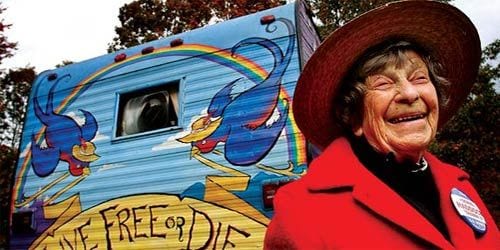
Judd Greg is a Republican tough guy from New Hampshire running for US Senate on a pro-war, pro-big business, pro-George W. Bush platform. When his Democratic opponent drops out of the race, Doris “Granny D.” Haddock, a 94-year-old great-grandmother with no political experience, decides to take on the incumbent. Despite a sizeable difference in the funding of the two campaigns, the New Hampshire woman actually gives Greg a run for his money. It almost seems like one of those too-cute-for-journalism stories that you always see on the local news.
But this second documentary by filmmaker Marlo Poras (Mai’s America was her first) isn’t as puppy-dog sweet and simple as you might expect. One of the richest and most complex characters in the film, Doris’ son Jim is always lurking behind his mother, and you’re constantly wondering how much of the woman’s rhetoric she has actually come up with herself and how much she has been force-fed by her baby-boomer son and campaign manager.
Throughout the documentary, Granny D. delivers informed-sounding speeches with the poise of a true politician. But when she’s asked to debate her competitor and think on the fly, she struggles even to form a coherent sentence. Greg brushes her off like a joke. (And while the senator himself isn’t the least bit likable, he’s right not to take Granny D. seriously.) Despite the numbers, she’s not a qualified candidate for the US Senate. She’s just a cute old woman with a few one-liners from the leftist canon. You ache inside at the spectacle of the debate scene as you would ache for a young performer whose stage-parents have pushed her too far.
That’s how Poras succeeds. She follows the story her subjects want to tell, yes. But she also captures everything else. The idea of having an elderly middle-class woman in the US Senate only seems like a charming idea until she starts using the antiquated and insensitive language of a bygone generation. At a rally midway through the film, Granny D. remarks to a young black woman that it’s good to see some color in the crowd. The woman, of course, takes no offense. She even praises Granny D. for her candidness. But everyone knows, or ought to know, that that’s not the sort of candidness America needs in its legislature. So once again, the oversimplified “good versus evil”, “donkey versus elephant” scenario is cast into doubt and the story becomes richer for it.
On top of everything else, Granny D. has a sense of humor, which helps make the film interesting, even when the story’s outcome seems perfectly evident. Her speech is spellbinding for the same reason that shock-jockeys are still popular in America: you never know what will come out of her mouth next. At one point, almost out of nowhere, the burgeoning politician describes an experience in which she smoked marijuana with actor Woody Harrelson. It had been her first experience with the drug, and her matter of fact retelling of the incident might be the most memorable soundbyte in the film.
With such moments, Run Granny, Run ends up being far from the one-dimensional six o’clock news story it could have been had its production been entrusted to someone less skilled than Poras. If the local news version would have told us only that anyone can run for US Senate, Poras’ version reminds us of the potential consequences of that fact. Anyone can run for the US Senate! With a bit of charm, any incompetent old woman could be your next US senator! As sweet and funny Poras’ documentary is, that reality is just as frightening as any Republican winning the race.

![Call for Papers: All Things Reconsidered [MUSIC] May-August 2024](https://www.popmatters.com/wp-content/uploads/2024/04/all-things-reconsidered-call-music-may-2024-720x380.jpg)



